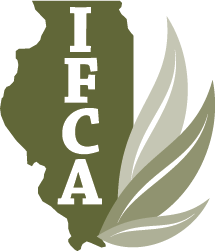Pesticide Update & Guidance on Dicamba Issues
In our efforts to best assist and represent the industry, IFCA is here to listen to your feedback from the field, provide some guidance and share what we know related to pesticide use issues this application season. Here is what we know and our assessment. We hope it is helpful and we do not by any means have all the answers.
1. As of today, July 19, the Illinois Department of Ag has logged a total of 210 formal misuse complaints, 83 of those attributed to dicamba related applications. The majority of formal complaints are related to impact on soybeans; relatively few are specialty crop or homeowner complaints.
2. The investigations of these cases by IDA are on-going and it could be weeks before any conclusions can be determined. Not all instances are being reported to IDA but are being handled by the parties involved. As with all pesticide misuse investigations, it is uncommon for these cases to be resolved either by IDA or the parties involved until much later on. Patience by all involved is vital, as these investigations need time to play out to determine causation. We have a very good regulatory process, and a very good industry process, in place but it takes time in order for full determinations and decisions to be made. It can take weeks if not months. That has always been the case with application or product issues that occur during the growing season.
3. Dr. Hager at the University of Illinois published an educational Bulletin on July 18 addressing the current dicamba issue in Illinois, click here.
4. IFCA is in regular contact with chemical product personnel and share feedback with them as to what we are hearing from our members. They too need time to assess the situations and are doing so. In many cases the applicators feel that the label was followed and more information and assessment of these cases is necessary to better evaluate the impact of weather on this new technology. Given the high sensitivity of soybeans to dicamba, other issues are also at play as discussed in Dr. Hager's bulletin. We have also fielded quite a few phone calls from farmers who are looking for the best approach to handle situations in their soybean fields from applications performed by private applicators. We share that feedback with Illinois Farm Bureau staff, who is also working to provide the best possible information to their members.
5. It is apparent that tensions are high and that farmers and retailers alike are feeling the stress of assessing dicamba related symptoms in non DT soybean fields this year, regardless of whether the product was applied by a commercial or private applicator. Many retailers have made an internal, voluntary decision to cease the sale and use of all dicamba products at this point in the growing season as they continue to work with their customers to evaluate fields. IFCA recommends you contact the chemical product representative to involve them in the discussion and ask them to evaluate the field regardless of who the applicator was.
6. There appears to be an expectation that farmers will or should be compensated immediately for symptoms of damage before the crops are taken to harvest to determine yield. This is rarely the case with any other pesticide misuse situation, either past or present, and is not unique to dicamba. As a whole, the industry has nearly always successfully worked together to respect the investigation and evaluation process and assess the impact of the situation at harvest and what needs to be done at that time to be fair. In order to steward this new technology into the future, measured approaches to each situation are recommended. Only by working together will farmers, retailers and the chemical industry improve upon the situation.
7. The insurance industry will also have a say in this and that too needs to be taken into consideration in the months to come. Insurance companies are key partners in our industry and it would be very troubling to see them take actions to exclude this product from future coverage, since insurance is required in order to obtain a commercial applicator license. Their evaluation of the cases turned in to them also needs time to evolve (often through harvest) and again, patience is paramount here.
8. By far, the feedback from retailers and farmers is that this new technology is important but there are certainly issues that need to be addressed going forward to improve the situation, including for farmers who desire to grow organic, non GMO and other non DT soybeans. The specialty crops and homeowners also need to continue to be considered and their ability to freely grow those crops respected.
We hope that sharing what IFCA has learned from this current situation, and from experience, is helpful. Our industry, and how we handle this, is in the limelight right now and how the public perceives our handling of this new technology, the challenges it has brought with it, and the outlook for the future really is up to us. Patience, respect for each other, fairness for all involved and learning from this experience will hopefully prevail.
IFCA welcomes your feedback on this and other issues that impact your business. Please feel free to call us or email us at jeanp@ifca.com or kj@ifca.com.
